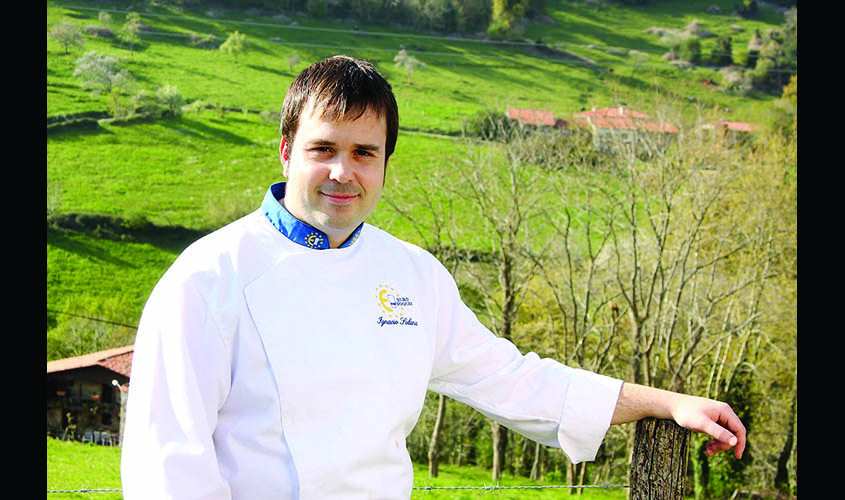Michelin-starred chef, Ignacio Solana, is a fourth-generation culinary expert from Cantabria, Spain. “My job has always been a way of life rather than a profession. I spend the whole time thinking about food—24 hours a day, 365 days a year,” said the world-renowned chef about his career. Earlier this year, Chef Solana curated a meal at the Taj Mahal, New Delhi as part of the event, Spanish Extravaganza.
Chef Solana grew up listening to his family members talk passionately about cooking. He recalled that cooking always felt natural to him, even before he could develop an interest in it. Today he has taken the restaurant, Solana, opened by his great-grandparents in 1938 in Cantabria, to new heights—the coveted Michelin star being one of the accolades he received in 2012.
Even after having the option to join the family business, Chef Solana decided to get formal culinary education and gained experience at various award-winning restaurants of the country. He said, “I started working at another restaurant when I was 19. It exposed me to new techniques and possibilities. I realised there were so many different ingredients and ways of preparing food and I became hooked. I still remember making a Carpaccio from Venison Tenderloin which tasted amazing and it blew me away, because up until then, I didn’t think I liked the taste of venison. But I soon learnt that like many products, one could prepare it in so many different ways. I decided I was never going to reject an ingredient again.”

Chef Solana always had a vision for the restaurant he inherited. After taking over its reins as a 24-year-old, the chef transformed the bar and restaurant into a gastronomic restaurant. He also reinterpreted his family’s traditional recipes into more modern dishes. Considered one of the important figures popularising contemporary Spanish cuisine around the world, the chef regards it as his second nature. In fact, he finds it easy to mix traditional and cutting-edge processes in the kitchen. The trick, according to him, is to know where the perfect balance lies—in the middle.
Applying this philosophy at his restaurant worked for Chef Solana. At the age of 31, he won the Michelin star and that, in his words, “changed everything”. He said, “Your attitude becomes even more positive, because now you strive more than ever to better yourself. Your sense of responsibility grows because you need to maintain what you have achieved. It makes you more ambitious. Before winning the star, I was relaxed. Afterwards, I wanted to improve on a daily basis. Having the star has great and positive repercussions. You gain respect from your peers, professionals, the media and the public in general. Other chefs instantly listen to you because they know how hard it is to attain a star. It’s what every chef wants. Your client base grows and doors open for you everywhere. People want to work with you and the world becomes full of opportunities.”
But there are immense responsibilities accompanying the prestige of Michelin star, which often weigh heavily on chefs. Chef Solana has been concerned about that: “Everything has to be perfect, every day. You can’t have a bad day. Your creativity needs to be constant and it has to be on the button. It’s vital to be current, to know all the latest trends. You can’t sit back and relax. Your restaurant also has to be spotless and well designed. Everyone on the team has to give it their all, constantly. Cooking is the easy part!”

Looking back at his journey, Solana describes it as “demanding but hugely satisfying”. A man who has achieved much in his field, Chef Solana pointed out that success as a chef comes with various skills. He said, “Even if you have a great talent for cooking, it isn’t enough. You need to have skills like an economist, you must be an excellent communicator, a business-minded person and an artist… The list goes on. I suppose you have to be a bit mad to work in this profession!”
Today, the chef enjoys exploring various culinary cultures. He has travelled to Canada, Colombia, Thailand and now India for cooking events and exchanged knowledge with the local chefs. The chef thinks it’s a good practice to mix different food cultures as every place offers a unique culinary tradition, products, techniques, flavours and textures. Going global with the flavours is what he envisions for his restaurant.
Talking about his maiden visit to India, Chef Solana was said he was quite fascinated by Indian culinary heritage, the diversity of cuisines and the richness of flavours. About serving Spanish delicacies in Delhi, he said, “The city has been witnessing a rising demand for new experiences. In this day
Many traditional chefs often criticise the fusion food trend, or the modern urge to with tinker with age-old recipes. But Chef Solana specialises in that area. Not only does he view these methods as positive, he thinks chefs who experiment with cuisines are “creating history”. Even if the experiments aren’t successful, the impulse to create something new is to be cherished in itself.
According to Chef Solana, Spanish cuisine has improved because of the fusion of techniques of contemporary gastronomy with traditional recipes.
Embracing new methods and recipes has also helped Chef Solana to develop a food waste management system. He said, “We don’t throw anything away. There are hundreds of strategies for using up ingredients which have been left over in the preparation stage. They get made into tapas, they go into the meals for the staff. Even the green leafy bits of carrots are used to make stocks. You have to use everything. It’s a cost issue and also there is a humanitarian and environmental factor which is important. No self-respecting chef would ever throw food away.”

